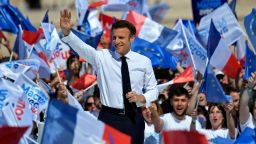Emmanuel Macron will win France’s presidential election, pollsters project, fending off a historic challenge from far-right candidate Marine Le Pen during Sunday’s runoff vote.
Macron is projected to take 58.8% of the vote, according to an analysis of voting data by pollsters Ipsos & Sopra Steria conducted for broadcasters France Televisions and Radio, making him the first French leader to be reelected in 20 years.
While the contest was a rematch of the 2017 French presidential runoff, much of Europe watched the election with unease. A Le Pen presidency would have fundamentally changed France’s relationship with the European Union and the West, at a time when the bloc and its allies rely on Paris to take a leading role in confronting some of the world’s biggest challenges – most notably, the war in Ukraine.
And though Macron’s pitch to voters of a globalized, economically liberal France at the head of a muscular European Union won out over Le Pen’s vision for a radical shift inward, the 41.2% of people who voted for her put the French far right closer to the presidency than ever before.
Le Pen’s performance is the latest indication that the French public is turning to extremist politicians to voice their dissatisfaction with the status quo. In the first round, far-left and far-right candidates accounted for more than 57% of the ballots cast.
Many of those unsatisfied with the final two candidates stayed home. Voter turnout was on track to be the lowest for a runoff since 2002, according to government data released late afternoon local time.
Official results are expected on Monday. French pollsters typically release projections at 8 p.m. local time, when the polls close in major cities and several hours before the French Interior Ministry releases the official results. These projections, which are based on data from voting stations that close at 7 p.m. in the rest of the country, are usually used by the candidates and French media to declare a winner.
Macron’s supporters, gathered on Champs de Mars in the shadow of the Eiffel Tower in central Paris, broke out in massive cheers when the news was announced. The celebration was significantly lower-key than after Macron’s victory in 2017, though he did once again walk to deliver his speech to the European anthem, commonly referred to as the “Ode to Joy.”
In his victory speech, Macron vowed to be the “president for each and every one of you.” He then thanked his supporters and acknowledged that many, like in 2017, voted for him simply to block the extreme right.
Macron said that his second term would not be a continuation of his first, committing to address all of France’s current problems.
He also addressed those who supported Le Pen directly, saying that he, as president, must find an answer to “the anger and disagreements” that led them to vote for the far right.
“It will be my responsibility and that of those who surround me,” Macron said.
Le Pen delivered a concession speech within a half hour of the first projection, speaking to her backers gathered at a pavilion in western Paris’ Bois de Boulogne.
“A great wind of freedom could have blown over our country, but the ballot box decided otherwise,” Le Pen said.
Still, Le Pen acknowledged the fact that the far right had never performed so well in a presidential election. She called the result “historic” and a “shining victory” that put her political party, National Rally, “in an excellent position” for June’s parliamentary elections.
“The game is not quite over,” she said.
Macron and Le Pen advanced to the runoff after finishing in first and second place, respectively, among 12 candidates who ran in the first round on April 10. They spent the next two weeks crisscrossing the country to woo those who did not vote for them in the first round.
Macron had to convince voters to back him again despite a mixed record on domestic issues, like his handling of the yellow vest protests and the Covid-19 pandemic.
Le Pen’s campaign attempted to tap into public anger over a cost-of-living squeeze by campaigning hard on helping people cope with inflation and rising energy prices – a major concern for the French electorate – rather than relying on the anti-Islamist, anti-immigration and Euroskeptic positions that dominated her first two attempts at winning the presidency in 2017 and 2012.

She presented herself as a more mainstream and less radical candidate, even though much of her manifesto remained the same as five years ago. “Stopping uncontrolled immigration” and “eradicating Islamist ideologies” were her manifesto’s two priorities, and analysts said many of her policies on the EU would have put France at odds with the bloc.
Though Le Pen had abandoned some of her most controversial policy proposals, like leaving the European Union and the euro, her views on immigration and her position on Islam in France – she wants to make it illegal for women to wear headscarves in public – did not change.
“I think that the headscarf is a uniform imposed by the Islamists,” she said during the one and only presidential debate Wednesday. “I think that the great majority of the women who wear one can’t do otherwise in reality, even if they don’t dare say so.”
But Vladimir Putin was perhaps her biggest political liability. Before Russia invaded Ukraine, Le Pen was a vocal supporter of the Russian President, even visiting him during her 2017 campaign. Her party also took out a loan from a Russian-Czech bank several years ago that it is still repaying.
Though she has since condemned Moscow’s invasion, Macron attacked Le Pen on her previous positions during the debate. He argued that she could not be trusted to represent France when dealing with the Kremlin.
“You’re speaking to your banker when you’re talking to Russia. That’s the problem,” Macron said during the debate. “You cannot properly defend the interests of France on this subject because your interests are linked to people close to the Russian power.”
Le Pen said her party was forced to seek funding abroad because no French bank would approve the loan request, but the defense seemingly failed to resonate.
CNN’s Simon Bouvier, Xiaofei Xu, Camille Knight and Elias Lemercier contributed to this report.




Comments